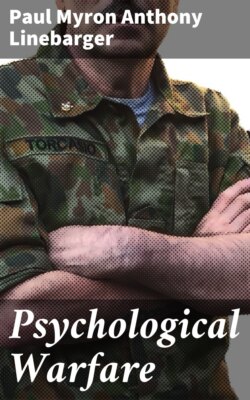Читать книгу Psychological Warfare - Paul Myron Anthony Linebarger - Страница 34
На сайте Литреса книга снята с продажи.
Security Procedures.
ОглавлениеSecurity procedures for psychological warfare involve the usual common-sense precautions which apply to all operations, and which may be summarized in the following rules:
(1) Classification should be kept at an absolute minimum. No information should be classified unless there are genuinely strong reasons for supposing that it would benefit the enemy. Classification and declassification should be the responsibility of designated officers trained for the task. (In World War II, many American civilians classified information recklessly, with the result that all classification became a subject of disrespect. The author once found a highly classified inter-Allied plan in the hands of an elderly woman stenographer in Washington, who safeguarded the information by leaving the papers in a desk drawer which had no pull. The drawer had to be opened with a nail file and that fact comprised the "security.")
(2) Security should apply, generally speaking, to units as a whole, taking working units up to the limit of face-to-face working acquaintance as a base. It is unsound procedure to give certain individuals a higher level of information than others, since the privileged individuals will be tempted to display their inside knowledge, and the underprivileged individuals will be goaded by unwholesome, resentful, and acute curiosity. Either the entire unit should be given the information, or denied it.
(3) Security should not be applied for editorial purposes. Censorship is a separate function. Improper security procedures, vesting arbitrary powers in stated officers, may tempt the security officer to express his personal literary, artistic, or political preferences under the guise of maintaining security. The inevitable consequence is the breakdown of both security and of procedure. Censorship should be applied in conformity with national or theater censorship policies. Review and estimate of radio or leaflet output is another function.
(4) Security for printed materials is easy enough to maintain. The leaflets can be sent to the G-2 to check, or wherever else security functions may be vested. Radio security is another problem. Experience in World War II indicates that spot news cannot wait for routine security, but must be processed through. Two types of control, supplementing one another, are desirable:
Security liaison on a 24-hour basis should be available to the radio operatives for the rapid processing of military news. The security duty officer should be indoctrinated with an attitude of cooperativeness, based on an understanding of the value of propaganda, and should conceive it as his mission to explain the needs of radio propaganda to his superiors, rather than taking the attitude of being superior to the radio operatives. There is a sound psychological reason for this. The presence of a sympathetic security officer will increase cooperativeness on the part of the propaganda broadcaster. An unsympathetic one will merely maintain the official dignity of his office and position. High morale on the part of script writers is more important than high morale of security officers.
Security supervision can be exercised by monitoring facilities: that is, the security officers can equip themselves with a good radio receiver and listen to the broadcasts without ever meeting the broadcasters. A critical frame of mind on the part of such security personnel is desirable. Unlike liaison officers, they need not be cooperative. Since their criticism applies after the operation, they can afford to apply rigorous standards. (During most of 1942 and 1943, no one in Washington had any idea of what actually went out from San Francisco. The civilians who broadcast to Japan received elaborate orders to do this and to do that, but the Washington policy-makers did not know what was going on the air. On one occasion, the civilian propaganda broadcasters told the Army in Washington that the information was too highly classified to be released or circulated. The result was that Army and Navy found out what OWI was doing by receiving reports from listeners in the Pacific.)
Security liaison can check propaganda output in the process of transmission; security supervision can check the output after it goes on the air, and can transmit through channels recommendations for punitive or corrective action. The final military connection should exist (for an all-military psychological warfare group) in the person of a responsible commanding or executive officer. For a civilian group functioning under military control the military connection should lie in the hands of an officer capable of watching a great deal and of saying little. Attempts by security to act as propagandists have been found to be as disastrous as the efforts of operators to get along without security.
